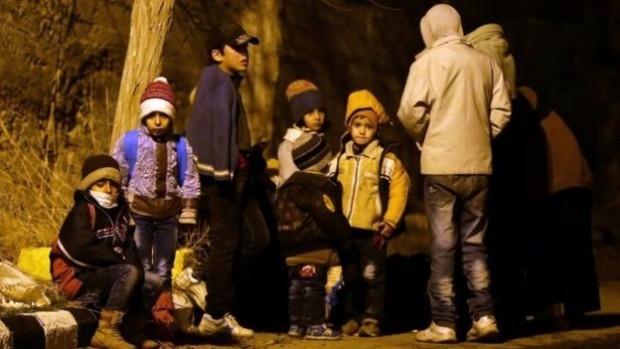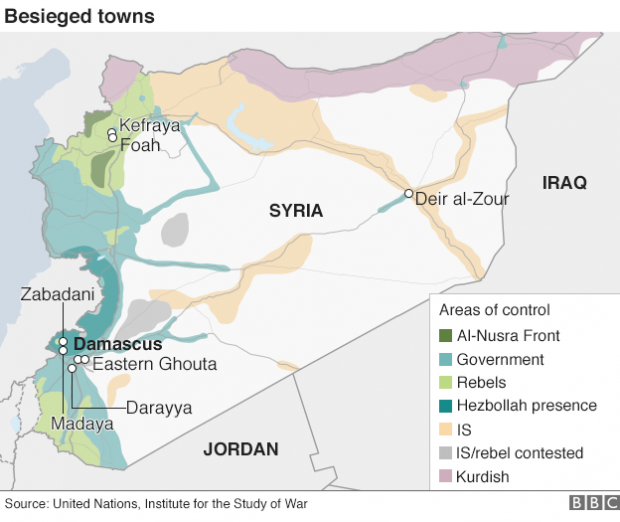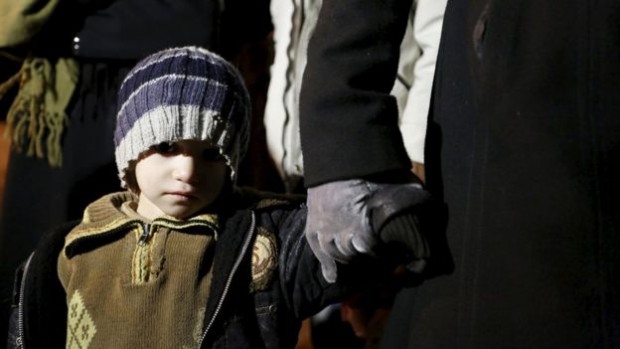Syria: over 400 residents must urgently evacuate Madaya

BBC
Some 400 people in the besieged Syrian town of Madaya need to be urgently evacuated for medical treatment, says UN humanitarian chief Stephen O’Brien.
Mr O’Brien was speaking after the UN Security Council held an urgent meeting to discuss the crisis in the rebel-held town near Damascus.
Earlier, an aid convoy brought food to 40,000 town residents who have been under government siege for months.
The UN says it has received credible reports of people dying of starvation.
Monday’s aid delivery was the first allowed into Madaya since mid-October, when the UN’s World Food Programme took a month’s supply of food rations for 20,000 people.
Simultaneously, aid lorries entered two towns besieged by rebel forces in the northern province of Idlib under a deal between the warring parties.
The situation in Foah and Kefraya is also said to be dire, with an estimated 20,000 people trapped there since March.
Mr O’Brien said that a humanitarian co-ordinator at the hospital in Madaya saw around 400 people who needed to be evacuated immediately.
“We must seek to do this and put the arrangements in place as soon as possible for medical treatment. Or they are in grave peril of losing their lives and dying with either the causes being from malnutrition or for complications for other medical reasons,” Mr O’Brien said.
A few town residents were given permission to leave and could be seen with their belongings awaiting evacuation.
In total, some 44 lorries operated by the UN, the International Committee of the Red Cross (ICRC), the Syrian Red Crescent and the World Food Programme (WFP) reached Madaya from Damascus on Monday.

The convoy brought in food and medicines, as well as blankets, shelter materials and soap, with distribution expected to continue through the night.
Pawel Krzysiek, who is with the ICRC in Madaya, said: “The people… were coming every five minutes asking, ‘Listen, did you bring food, did you bring medicine?’
“Some are smiling and waving at us but many are just simply too weak, with a very bleak expression, too tired.”
Towns under siege
March 2015: Foah and Kefraya in Idlib province are besieged by rebel groups and the al-Qaeda-affiliated al-Nusra Front, with an estimated 12,500 trapped.
July 2015: Madaya, near Damascus, is besieged by government forces and their allies in Lebanon’s Shia Islamist Hezbollah movement.
September 2015: The situation in Foah and Kefraya worsens after the fall of a nearby government air base, where helicopters had been able to land with food supplies. Reports emerge of people eating grass to survive.
October 2015: UN delivers one month’s supply of food rations for 20,000 people in Madaya.
December 2015: Dozens of wounded civilians and fighters evacuated from Foah, Kefraya, Zabadani and Madaya. Reports begin to emerge of people starving in Madaya.
January 2016: UN says it has received credible reports of people dying of starvation in Madaya
Mr El Hillo told the BBC that UN staff saw starving children in the town.
One resident, Hiba Abdel Rahman, 17, told the AFP: “I saw a young man killing cats and presenting the meat to members of his family as rabbit. Some people went through garbage bins, others ate grass.
“We sought food from the fighters but they refused to give it to us.”

Madaya, which is about 25km (15 miles) north-west of Damascus and 11km from the border with Lebanon, has been besieged since early July by government forces and their allies in Lebanon’s Shia Islamist Hezbollah movement.
They want to capture the rebels holed up there, including fighters from the hardline Islamist group Ahrar al-Sham and the al-Qaeda-linked al-Nusra Front.
Meanwhile, 21 lorries on Monday entered Foah and Kefraya. The villages are about 7km (5 miles) to the north of the provincial city of Idlib, which is controlled by a rebel alliance including Ahrar al-Sham and al-Nusra.
They were carrying basic food items – including rice, vegetable oil, flour, sugar and salt – as well as water, infant formula, blankets, medicines and surgical supplies.
Medical charity Medecins Sans Frontieres (MSF) said on Sunday that a total of 28 people – including six children less than one year old – had died of starvation in Madaya since 1 December.
However, Syrian officials and Hezbollah have denied that there have been any deaths in the town.
“The Syrian government is not and will not exert any policy of starvation against its own people,” Syria’s UN ambassador Bashar Jaafari was quoted as saying by the Associated Press.
Rebel leaders were also accused of selling food to Madaya residents at exorbitant prices.
Blockades have been a feature of Syria’s civil war. Up to 4.5 million people live in hard-to-reach areas, including nearly 400,000 people in 15 besieged locations who do not have access to life-saving aid.
What’s happening in Syria?
More than 250,000 Syrians have lost their lives in almost five years of conflict, which began with anti-government protests before escalating into a brutal civil war. More than 11 million others have been forced from their homes as forces loyal to President Bashar al-Assad and rebels opposed to his rule battle each other – as well as jihadist militants from Islamic State.
Why are civilians under siege?
All parties to the conflict are using siege warfare, encircling populated areas, preventing civilians from leaving and blocking humanitarian access in an attempt to force opponents to surrender. Shortages of food, water, medicine, electricity and fuel have led to malnutrition and deaths among vulnerable groups.
Where are the sieges?
Government forces are besieging various locations in the eastern Ghouta area, outside Damascus, as well as the capital’s western suburb of Darayya and the nearby mountain towns of Zabadani and Madaya. Rebel forces have encircled the villages of Foah and Kefraya in the northern province of Idlib, while IS militants are besieging government-held areas in the eastern city of Deir al-Zour.
How to submit an Op-Ed: Libyan Express accepts opinion articles on a wide range of topics. Submissions may be sent to oped@libyanexpress.com. Please include ‘Op-Ed’ in the subject line.
- Libya’s HCS invites applicants for key state roles - December 31, 2023
- UK calls on Iran to prevent escalation in Israel-Hamas conflict - November 05, 2023
- Libyan Interior Minister: Immigrant shelter costs a fortune - November 05, 2023


